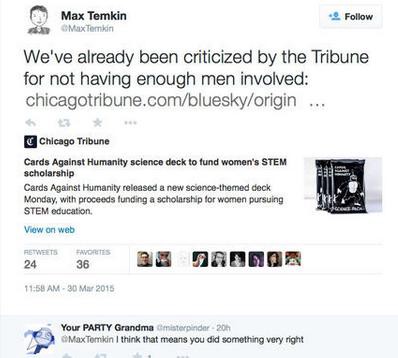Cards Against Humanity For STEM

People often have strong feelings about Cards Against Humanity, the game that bills itself cheerfully as being “for horrible people,” in which friends try to out-inappropriate each other for laughs. A deck only costs $25, making it an affordable — and, depending on your mood, entertaining — centerpiece of a night in. Of course, it could cost you much more than that in social capital if an offended person leaves your house mid-play.
No doubt cognizant of CAH’s polarizing effect on people, the game’s makers have invested in various gestures of goodwill, like sending people actual bullshit for the holidays and passing the profits on to Heifer International. The latest? The Cards Against Humanity Science Ambassador Scholarship, which, according to the Chicago Tribune, “aims to cover four years of tuition for one high school or college student who identifies as a female.” The special Science Pack costs only $10.
“By giving somebody a platform, not only does it hopefully increase public understanding of science … but also it can change a public perception of who a scientist is,” said Dillon, an astrophysics PhD candidate at MIT.
Cards Against Humanity, begun as a risque version of Apples to Apples created by eight high school friends, has grown into a 15-person company that now employs seven women, said Jenn Bane, the company’s community manager.
Dillon and Bane said the company is still working out details of the application process but it will open before the next college application cycle.
“We’re looking for someone who is excited to share her love of science,” Bane said. …
Previous special Cards Against Humanity decks have raised nearly $2 million over the past few years and benefited DonorsChoose.org and others.
Lots of websites were enthused about the idea, although none, perhaps, was as effusive as the normally contrary Slate:
This game is massively and completely and utterly NSFW. It’s very much only for adults. The official game motto is, “A party game for horrible people” and that’s the only thing about this game that’s not a joke. The game is incredibly offensive, a hard R rating for sure, hugely over-the-top on purpose. I’m sure a half-dozen psychology theses could be written about why it’s so popular, but popular it is. Millions have been sold.
Having said that, this part is amazing: 100% of the proceeds from sales of the science pack will fund scholarships for women seeking STEM degrees (CAH put out a press release about this). And we’re talking full-ride scholarships here. The applications will be reviewed by a panel of more than 40 women, professionals with advanced STEM degrees. The thinking is that this panel will also provide a network that can help support the scholarship recipients. I think that’s a fine idea.
As of the time I posted this article — just a few days after sales began — well over $230,000 has been raised by sales of the pack! Wow. Seriously, wow.
All forgiven? Is everyone on board now? Not quite.
Almost immediately after the initial article ran in the Tribune, the newspaper posted an update, both about the endeavor’s success and the ongoing controversy. The Trib had quoted an expert who, while she praised the initiative in general, pointed out that CAH’s idea of an all-female panel of scientists to pick the scholarship recipients would do better to be gender-inclusive. This occasioned some grumbling on Twitter from CAH co-creator Max Temkin.

So the Trib, naturally, covered the controversy. (Was there really any? Unclear.) But the underlying controversy of Cards Against Humanity remains:
Just like I want to believe that we’re all laughing at jokes about “black people” or “The Third World” purely because they’re horrible and not because some tiny part of us enjoys the schadenfreude of being able to make the joke and not be the one joked about. I want to believe games that devolve into crudely insulting each other based on our sore spots are truly meant “in fun” and not a socially approved way to get away with bullying. I want to believe everyone’s motives are pure, even though I honestly don’t even know that about my own motives.
I want to believe that I can have absolute confidence that neither I nor any other people around me are horrible. Cards Against Humanity is built on that wishful thinking.
Support The Billfold
The Billfold continues to exist thanks to support from our readers. Help us continue to do our work by making a monthly pledge on Patreon or a one-time-only contribution through PayPal.
Comments